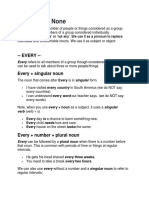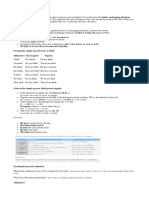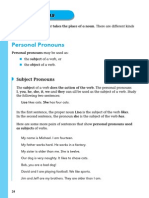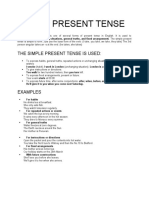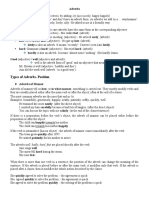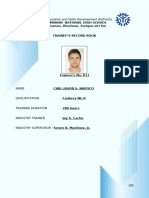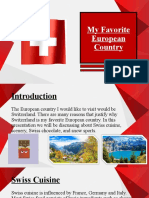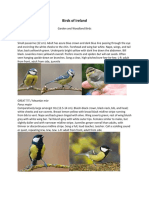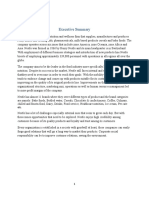Words Often Confused CCU Writing Center: Our Class Meets at Eight
Words Often Confused CCU Writing Center: Our Class Meets at Eight
Uploaded by
nylashahidCopyright:
Available Formats
Words Often Confused CCU Writing Center: Our Class Meets at Eight
Words Often Confused CCU Writing Center: Our Class Meets at Eight
Uploaded by
nylashahidOriginal Description:
Original Title
Copyright
Available Formats
Share this document
Did you find this document useful?
Is this content inappropriate?
Copyright:
Available Formats
Words Often Confused CCU Writing Center: Our Class Meets at Eight
Words Often Confused CCU Writing Center: Our Class Meets at Eight
Uploaded by
nylashahidCopyright:
Available Formats
Words Often Confused
2007
CCU Writing Center
Revised by Lo Pirie
a, an Use an before a word that begins with a vowel sound (a, e, i, o, and u). an orange, an essay, an heir (silent h), an honest man (silent h), an umbrella, an umpire, an uncle, an ulcer (all the us sound like uh) Use a before a word that begins with a consonant sound (all the sounds except the vowels) plus u or eu when it sounds like yu. a pencil, a hotel, a history book, a university, a uniform, a union, a unit (all the us sound yu). A European trip (Eu sounds like yu). accept, except Accept is a verb. Use except when it is not a verb. I accept your invitation. Everyone came except him. Advise is a verb. Use advice when it is not a verb. Pronounce these words correctly, remembering that the s sounds like z, and you will not confuse them. I advise you to go. I do not need any advice. Affect is a verb. Use effect when it is not a verb. If a, an, or the is in front of the word, then you know it is not a verb, and you will use effect. The lack of rain affected the crops. The lack of rain had an effect on the crops. The lack of rain had a bad effect on the crops.
advice, advise
affect, effect
all ready, already If you can leave out the all and the sentence still makes sense, then all ready is the form to use. Im all ready to go. (Im ready to go makes sense.) Dinner is all ready. (Dinner is ready makes sense.) If you cant leave out the all and still have the sentence make sense, then use already (the one with the all left in it). Im already late. (Im ready late does not make sense.) are, or, our Are is a verb. Or is use between two possibilities as tea or coffee. Our shows we possess something. We are studying English. Take it or leave it. Our class meets at eight. brake, break Brake means to slow or stop motion. Its also the name of the devise that slows or stops motion. Break means to shatter. You brake the speed of a car. You slam on your brakes. You break a dish or an engagement or a track record. I will choose a partner right now.
choose, chose
I chose a partner yesterday. clothes, cloths coarse, course Her clothes were attractive. We used soft cloths to polish the car. Coarse describes texture, as coarse cloth. Course is used for all other meanings. Remember this sentence: Of course you are taking this course. Find the tree us in that sentence and then remember that those words are always spelled with u. Her suit was made of coarse material. Of course I enjoyed that course. A complement completes something. Compliment means praise. Remember I like compliments, and you will remember to use the i spelling. A 30-degree angle is the complement of a 60-degree angle. She gave him a compliment.
complement, compliment
conscience, conscious The extra n in conscience should remind you of NO, which is what your conscience often says to you. The other word conscious simply means aware. My conscience bothers me because I ignored him. I was not conscious that it was raining. desert, dessert Dessert is the sweet one, the one you like two helpings of. So give it two helping of s. The other one, desert, is used for all other meanings. We had apple pie for dessert. Dont desert me. The camel moved slowly across the desert.
does, dose Does is a verb. A dose is an amount of medicine. He does his work well. She does not care about cars. He took a dose of medicine. forth, fourth Fourth with four in it is a number. Otherwise use forth. Note that while fourth has four in it, forty does not. Remember the word forty-fourth. This is our fourth game. That was our forty-fourth point. She walked back and forth.
have, of
Have is a verb. When you say could have, the have sounds like of, but it must not be written that way. Of is a preposition. I should have finished my work sooner. Then I could have gone home. I often think of him. Its always means it is or it has. Its is a possessive. 2
its, its
Its too late now. Its been a long time. The committee gave its report. knew, new Knew has to do with knowledge (both start with k). New means not old. I knew that I wanted a new job. know, no Know has to do with knowledge (both start with k). No means not any. I know she has no money left. Moral has to do with right and wrong; morale means group spirit. Pronounce them correctly, and you wont confuse themmral, morale. It was a moral question. The morale of the team was excellent. Passed is a verb. Use past when its not a verb. He passed the house. He walked past the house (its the same as He walked by the house, so you know it is not a verb). He is living in the past. He was going on his past reputation. Remember piece of pie. The one meaning a piece of something always begins with pie. The other one, peace, is the opposite of war. I gave him a piece of my mind. They signed the peace treaty.
moral, morale
passed, past
peace, piece
personal, personnel Pronounce these two correctly, and you will not confuse themprsonal, personnel. He had a personal interest in the election. He was in charge of personnel in the factory. principal, principle Principal means main. Both words have a in them: principal main The principal of the school spoke. (main teacher) The principal difficulty is time. (main difficulty) He lost both principal and interest. (main amount of money) A principle is a rule. Both words end in le: principle rule He lived by his principles. (rules) I object to the principle of the thing. (rule) quiet, quite Pronounce these two correctly, and you will not misspell them. Quiet is pronounced qui et. Be quiet. The book is quite interesting. 3
than, then Than compares two things. Then tells when (then and when sound alike and both have e in them). I would rather have this than that. Then he started home. their, there, theyre Their is a possessive. There points out something and is spelled like here. Remember here and there. Theyre always means they are. Their house is painted pink. There is where I left it. There were clouds in the sky. Theyre planning to come. threw, through Threw means to throw something in past time. If you do not mean to throw something, use through. He threw the ball. I threw away my chance. I came in through the out door. He threw the ball through the window.
to, too, two Two is a number. Too means more then enough or also. Use to for all other meanings. I have two brothers. The lesson was too difficult and too long. (more than enough) I found it difficult, too. (also) It was too much for two people to eat. weather, whether Weather refers to atmospheric conditions. Whether means if. Whether Ill go depends on the weather. were, where Were is a verb. Where has herein it, and both where and here refer to a place. Were you the winner? Where is he? Here he is. Where are you? Here I am. whos, whose Whos always means who is or who has. Whose is a possessive. Whos there? Whos been using my tennis racket? Whose book is this?
woman, women Remember that the word is just man or men with wo in front of it. wo man woman one woman wo men women two women your, youre Youre always means you are. Your is a possessive. Youre very welcome. Your toast is ready.
You might also like
- Very Very Effectivetaweez and WazaifDocument38 pagesVery Very Effectivetaweez and Wazaifnylashahid91% (23)
- ESL - English as a Second Language - Verbs: a QuickStudy Digital Reference GuideFrom EverandESL - English as a Second Language - Verbs: a QuickStudy Digital Reference GuideNo ratings yet
- Kameez Cutting and StitchingDocument36 pagesKameez Cutting and StitchingnylashahidNo ratings yet
- 06 British Literature TimelineDocument1 page06 British Literature TimelineMiranda Amalia Nasution100% (4)
- All, Every, NoneDocument4 pagesAll, Every, NoneMJ WilliamsNo ratings yet
- Union Council in RawalpindiDocument3 pagesUnion Council in RawalpindinylashahidNo ratings yet
- Banana Heart Business PlanDocument30 pagesBanana Heart Business PlanJam Meñoza67% (6)
- Beside and Besides: Just Can Mean 'Only', 'Scarcely', 'Nothing More Than'Document84 pagesBeside and Besides: Just Can Mean 'Only', 'Scarcely', 'Nothing More Than'Gagandeep PahwaNo ratings yet
- Commonly Confused WordsDocument8 pagesCommonly Confused WordsHìnn HoànggNo ratings yet
- Various Grammar Rules: Despite, in Spite ofDocument21 pagesVarious Grammar Rules: Despite, in Spite ofMarco MarsitoNo ratings yet
- Study Material GrammarDocument17 pagesStudy Material GrammarMaverick 2OPNo ratings yet
- 1.3. DeterminersDocument8 pages1.3. Determinerssofia hernandezNo ratings yet
- "The Adjective": Attibutively: in Sentence 1, Adjective Lazy Is Used Along With Noun. Therefore, If ItDocument10 pages"The Adjective": Attibutively: in Sentence 1, Adjective Lazy Is Used Along With Noun. Therefore, If Itsparkal starNo ratings yet
- Learn English - Grammar: Above and OverDocument36 pagesLearn English - Grammar: Above and OverAnis IftekharNo ratings yet
- 16 TensesDocument18 pages16 TensesAnonymous eCws3ENo ratings yet
- English Tenses: Simple Past TenseDocument5 pagesEnglish Tenses: Simple Past TenseHasnaoui DiaNo ratings yet
- Defining An Infinitive VerbDocument10 pagesDefining An Infinitive VerbGerardo CidNo ratings yet
- Universidad Tecnologica Del Suroeste de Guanajuato: Obed Armando Cabrera YbarraDocument17 pagesUniversidad Tecnologica Del Suroeste de Guanajuato: Obed Armando Cabrera YbarraObed Armando Cabrera YbarraNo ratings yet
- PronounsDocument7 pagesPronounsMarta JurasNo ratings yet
- Present: Simple Present Present Continuous Present PerfectDocument7 pagesPresent: Simple Present Present Continuous Present PerfectWaad AlteeNo ratings yet
- Guia para El TOEFLDocument36 pagesGuia para El TOEFLClaudio TorresNo ratings yet
- Correction NotesDocument12 pagesCorrection NotesMuhammad UbaidNo ratings yet
- CSC English PART 1Document14 pagesCSC English PART 1May Ann GervacioNo ratings yet
- PronounsDocument28 pagesPronounsMonica Adina BaneaNo ratings yet
- Present Tense Handout W KeyDocument14 pagesPresent Tense Handout W KeyAnaNițuNo ratings yet
- Singular and Plural NounsDocument26 pagesSingular and Plural NounsganesangNo ratings yet
- Grammatical Persons Pronouns List (1)Document9 pagesGrammatical Persons Pronouns List (1)Rachel FloresNo ratings yet
- Guía Primer Parcial Inglés 5Document18 pagesGuía Primer Parcial Inglés 5Mayte LópezNo ratings yet
- When To Use Any or SomeDocument7 pagesWhen To Use Any or SomeLiana de jesusNo ratings yet
- No. 6 - Moods of The VerbDocument14 pagesNo. 6 - Moods of The Verbandie hinchNo ratings yet
- Content and Function WordsDocument32 pagesContent and Function Wordsbaskoro tugasNo ratings yet
- PronounsDocument8 pagesPronounsapi-242894068No ratings yet
- English TensesDocument67 pagesEnglish Tensesdonisparta5No ratings yet
- Grammar Book 1Document54 pagesGrammar Book 1Safaa AltmemeNo ratings yet
- Uses of The Perfect InfinitiveDocument24 pagesUses of The Perfect InfinitivemiraeNo ratings yet
- The Simple Present Tense Is UsedDocument6 pagesThe Simple Present Tense Is UsedMade AnomaharsiNo ratings yet
- There Are Two Types of Relative Clauses, Defining and Non-Defining. in The Grammar Chart Below, You Can See The Main Differences Between ThemDocument7 pagesThere Are Two Types of Relative Clauses, Defining and Non-Defining. in The Grammar Chart Below, You Can See The Main Differences Between ThemMarbelly MadrizNo ratings yet
- Adverbs - Teorie I (Compendiu)Document5 pagesAdverbs - Teorie I (Compendiu)IulianaLacramioaraNo ratings yet
- A: Have You Met Him? B: Not YetDocument10 pagesA: Have You Met Him? B: Not YetSabih AhmedNo ratings yet
- Relative ProunounDocument10 pagesRelative ProunounnurhalizaatikaNo ratings yet
- Pronoun CompleteDocument27 pagesPronoun Completenaseemakbar674No ratings yet
- Classes of VerbsDocument4 pagesClasses of VerbsRoxana Caia GheboianuNo ratings yet
- UNIT 24 June 2021 08.23.22Document6 pagesUNIT 24 June 2021 08.23.22polyglotcmNo ratings yet
- 221000_Commonly Confused Words_20210405_055207Document4 pages221000_Commonly Confused Words_20210405_055207help.edificationNo ratings yet
- Determiners: Determiners Are Words Which Come at The Beginning of The Noun or Noun PhraseDocument2 pagesDeterminers: Determiners Are Words Which Come at The Beginning of The Noun or Noun PhraseVijay KumarNo ratings yet
- Jaftranscript 082314Document222 pagesJaftranscript 082314BhargaviMasilamaniNo ratings yet
- Determiners: Determiners Are The Words Which Are Used Before Nouns To Determine or Fix Their MeaningDocument19 pagesDeterminers: Determiners Are The Words Which Are Used Before Nouns To Determine or Fix Their MeaningVandana RawatNo ratings yet
- Business CommunicationDocument203 pagesBusiness CommunicationRajeshsharmapurangNo ratings yet
- English GrammarDocument23 pagesEnglish Grammarali8826373No ratings yet
- Be: Present Simple Form: They People and ThingsDocument63 pagesBe: Present Simple Form: They People and ThingsSasha Bertolotto100% (1)
- Present SimpleDocument4 pagesPresent SimpleMonica SusanaNo ratings yet
- Adverbs and Adverb PhrasesDocument6 pagesAdverbs and Adverb Phraseslantacoanthonette_alNo ratings yet
- Simple Present: He Wants, She Needs, He Gives, She ThinksDocument10 pagesSimple Present: He Wants, She Needs, He Gives, She ThinksAisyah RasdiNo ratings yet
- Common Erros NotesDocument16 pagesCommon Erros Notesweicheng930616No ratings yet
- The Present Simple Tense: Zion LanguagesDocument23 pagesThe Present Simple Tense: Zion LanguagesZion Languages100% (1)
- Homophones PDFDocument4 pagesHomophones PDFWinnie Bautista MercadoNo ratings yet
- Session Basic EnglishDocument47 pagesSession Basic EnglishAlitNo ratings yet
- Les Pronoms PersonnelsDocument7 pagesLes Pronoms PersonnelssriwanthiNo ratings yet
- Lessons-Activities Basic Intermediate-1Document65 pagesLessons-Activities Basic Intermediate-1JoeNo ratings yet
- Simple Present TenseDocument8 pagesSimple Present Tenseapostuadrian01No ratings yet
- Personal PronounsDocument11 pagesPersonal PronounsMonica MirlethNo ratings yet
- Possessives: Pronouns: Yours, Mine, Theirs, Ours, Hers, His, ItsDocument13 pagesPossessives: Pronouns: Yours, Mine, Theirs, Ours, Hers, His, Itssari hafizhNo ratings yet
- Confusing Words, Including Heteronyms; Or Why English is Difficult to LearnFrom EverandConfusing Words, Including Heteronyms; Or Why English is Difficult to LearnNo ratings yet
- GuíaBurros: Spanish Grammar Cheat Sheet: A quick and easy guide to Spanish GrammarFrom EverandGuíaBurros: Spanish Grammar Cheat Sheet: A quick and easy guide to Spanish GrammarRating: 4 out of 5 stars4/5 (1)
- Ubqari Wazaif 2 PDFDocument89 pagesUbqari Wazaif 2 PDFnylashahid60% (5)
- 1Document19 pages1nylashahidNo ratings yet
- Wazaf 2Document3 pagesWazaf 2nylashahidNo ratings yet
- Shaba e Barat WazaifDocument6 pagesShaba e Barat WazaifnylashahidNo ratings yet
- Quran Aur Ahadees Say Doao Ka IntikhaabDocument10 pagesQuran Aur Ahadees Say Doao Ka Intikhaabapi-3782112No ratings yet
- Surah e Al-MuzzammilDocument3 pagesSurah e Al-MuzzammilnylashahidNo ratings yet
- Shaba e Maraj and Bharat WazaifDocument2 pagesShaba e Maraj and Bharat Wazaifnylashahid100% (1)
- Masnoon Wazaif o AzkarDocument410 pagesMasnoon Wazaif o AzkarnylashahidNo ratings yet
- SAARC Quiz UnpublishedDocument77 pagesSAARC Quiz Unpublishednylashahid100% (1)
- Grammar, Usage, and MechanicsDocument2 pagesGrammar, Usage, and MechanicsnylashahidNo ratings yet
- Educators Educators Science and Arts Entry Test 2013 English McqsDocument3 pagesEducators Educators Science and Arts Entry Test 2013 English McqsnylashahidNo ratings yet
- Wazifa For Good Result in ExamsDocument3 pagesWazifa For Good Result in Examsnylashahid60% (5)
- Writing For College Tips and TricksDocument11 pagesWriting For College Tips and TricksnylashahidNo ratings yet
- Basic Arithmetic SkillsDocument30 pagesBasic Arithmetic SkillsnylashahidNo ratings yet
- Roll-Up Accessory Organizer: Shopping ListDocument3 pagesRoll-Up Accessory Organizer: Shopping ListnylashahidNo ratings yet
- Basic MathematicsDocument67 pagesBasic MathematicsnylashahidNo ratings yet
- Cinnamon: Cardamom Green and BlackDocument8 pagesCinnamon: Cardamom Green and BlacknylashahidNo ratings yet
- GK MCQ - SDocument201 pagesGK MCQ - SEhsan AlamNo ratings yet
- Arsalan Anwer CV PDFDocument4 pagesArsalan Anwer CV PDFnylashahidNo ratings yet
- Swords of Hazrat Muhammad (P.B.U.H)Document8 pagesSwords of Hazrat Muhammad (P.B.U.H)nylashahidNo ratings yet
- Visual AidsDocument6 pagesVisual AidsnylashahidNo ratings yet
- World in FocusDocument225 pagesWorld in FocusnylashahidNo ratings yet
- Glyconutrients and MannatechDocument5 pagesGlyconutrients and MannatechJillyStoneyNo ratings yet
- Customer SatisfactionDocument35 pagesCustomer SatisfactionKalpamay MashaharyNo ratings yet
- Tourism Traning Centre Politeknik Negeri Bali (TTC-PNB) : Executive SummaryDocument8 pagesTourism Traning Centre Politeknik Negeri Bali (TTC-PNB) : Executive SummaryBowoNo ratings yet
- Everyday Gourmet - Rediscovering The Lost Art of Cooking PDFDocument208 pagesEveryday Gourmet - Rediscovering The Lost Art of Cooking PDFFidel Andreetta100% (5)
- Bahasa Inggris Kelas XIIDocument2 pagesBahasa Inggris Kelas XIIMuhammad ImadudinNo ratings yet
- SITHKOP015 Food Cost (SRC)Document5 pagesSITHKOP015 Food Cost (SRC)sunuwarrajesh9No ratings yet
- 2.1. Cookery NC Ii Trainees Record Book 2Document39 pages2.1. Cookery NC Ii Trainees Record Book 2JAY CACHONo ratings yet
- Physico-Chemical Characterization of Various Powdered Milk Samples Available in Butwal Sub-Metropolitan City, Rupandehi, NepalDocument6 pagesPhysico-Chemical Characterization of Various Powdered Milk Samples Available in Butwal Sub-Metropolitan City, Rupandehi, NepalUttam ShresthaNo ratings yet
- Gulayan Sa Paaralan Work PlanDocument3 pagesGulayan Sa Paaralan Work PlanGene Rose Ylagan88% (17)
- Sadiq Oil Extraction (Final Report)Document36 pagesSadiq Oil Extraction (Final Report)Muhammad Nasir ShabbirNo ratings yet
- My Favorite European CountryDocument13 pagesMy Favorite European CountryAditya SinghNo ratings yet
- Speeches of English GrammarDocument41 pagesSpeeches of English GrammarPoonam AivalliNo ratings yet
- Birds of IrelandDocument28 pagesBirds of IrelandscumsurferNo ratings yet
- Inte Science Lab 4 - NMDocument2 pagesInte Science Lab 4 - NMgokashihNo ratings yet
- Vegetable Cutlet RecipeDocument2 pagesVegetable Cutlet RecipeSumathiNo ratings yet
- Cookies (100pcs) Quantity Price/Quantity Total AmountDocument3 pagesCookies (100pcs) Quantity Price/Quantity Total AmountAnnabelle Poniente HertezNo ratings yet
- (Khối 7) GELOSEA SECONDARY 1 MOCK TESTDocument9 pages(Khối 7) GELOSEA SECONDARY 1 MOCK TESTPhương TrầnNo ratings yet
- Group Exercise2Document2 pagesGroup Exercise2api-381836871No ratings yet
- K-12 TLE Grade 7 Fish ProcessingDocument2 pagesK-12 TLE Grade 7 Fish ProcessingAlliah Vera delos SantosNo ratings yet
- Consumer Behavior YogurtsDocument6 pagesConsumer Behavior YogurtsKushan MistryNo ratings yet
- Class 9 - La Civilisation CH 1 To CH 7 (1) 2Document6 pagesClass 9 - La Civilisation CH 1 To CH 7 (1) 2tivi0905No ratings yet
- Assay of AspirinDocument10 pagesAssay of Aspirindavin otooleNo ratings yet
- An Overview of NestleDocument24 pagesAn Overview of NestleFatheha JuieNo ratings yet
- Nasogastric Feeding or Gavage FeedingDocument47 pagesNasogastric Feeding or Gavage FeedingDr. Jayesh Patidar100% (1)
- Solar Collector - Flat Plate AnaylsisDocument33 pagesSolar Collector - Flat Plate AnaylsisSharath N YaleNo ratings yet
- Business-Plan Sample Layout Senior High SubjectDocument38 pagesBusiness-Plan Sample Layout Senior High SubjectSofia Mae BustilloNo ratings yet
- Newsletter Vol 5 4.4.14Document4 pagesNewsletter Vol 5 4.4.14Yakamia Primary SchoolNo ratings yet
- Popularity of Heritage Café Amongst The Youth of KolkataDocument43 pagesPopularity of Heritage Café Amongst The Youth of KolkataRupal DasNo ratings yet
- Survey Response Analysis: Frequency of Visits Made To Fast Food CentersDocument11 pagesSurvey Response Analysis: Frequency of Visits Made To Fast Food CentersYASH SHARMANo ratings yet




